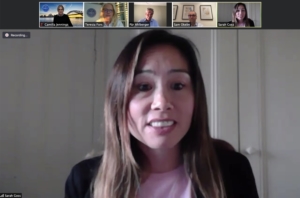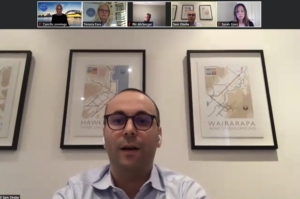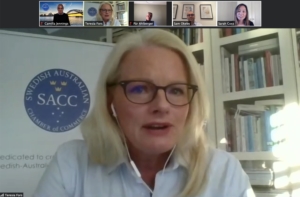“The World’s largest digital workplace experiment” and the COVID-19 pandemic’s impact on international cooperation and the global sustainability agenda
This third webinar in the SACC’s webinar series 11 June on the COVID-19 pandemic’s impact on business, trade and investment looked at the future beyond the pandemic and the conversation focused on what we have learned so far and what we believe will be “the new normal” for business. We also looked at the consequences of the pandemic on urban culture, the society at large as well as the pandemic’s impact on international cooperation and the global sustainability agenda.
On the panel for the webinar we were delighted to welcome back to SACC HE Pär Ahlberger, Ambassador for Sustainable Business at the Swedish Ministry for Foreign Affairs, who was calling in from Stockholm; Sarah Goss, Head of Innovation, Ericsson Australia & New Zealand as well as Sam Okeby, Head of Commercial Development, Lendlease Australia.
 We commenced the conversation in regards to how technology has been such an important enabler for all of us to be productive whilst working from home. Sarah Goss, commenced the conversation with “We are at a moment in time which has really placed a spotlight on what is an ‘essential service’ and we have all seen the essential nature of connectivity. Our communications networks are recognized as critical national infrastructure”.
We commenced the conversation in regards to how technology has been such an important enabler for all of us to be productive whilst working from home. Sarah Goss, commenced the conversation with “We are at a moment in time which has really placed a spotlight on what is an ‘essential service’ and we have all seen the essential nature of connectivity. Our communications networks are recognized as critical national infrastructure”.
She continued by recognising that despite a 70 percent increase in usage of the NBN, the network is showing a lot of robustness and reliability in this time of crisis.
Sarah also made reference to a report released on 9 June 2020, by global research company OMDIA (formerly Ovum), stating that Australia is ranked 12th out of 22 countries in the global 5G market which have been examined for their deployment of the technology. The report used operator launches, network coverage, subscriber take-up, 5G spectrum availability and the regulatory ecosystem to rank each 5G market – but rankings were determined as of the end of 2019. With the impact of COVID-19 there has been some increased focus on 5G in Australia.
As a testament to the criticality to accelerate the roll-out of 5G, Telstra CEO Andy Penn announced in May this year that Telstra will bring forward its $500 million of capital expenditure to increase capacity in their network which was planned for the second half of FY21 into the calendar year 2020.
Sarah continued “Through COVID-19, we have seen a huge acceleration in digitization across the economy including telehealth, remote learning, remote working and e-commerce. We believe 5G will be a key enabling technology to support Australia’s digital economy into the future”.
Sarah also recognised that this crisis and the extensive remote work set-up, has certainly highlighted that it is critical to get the people dimension right and that a remote working set-up has also shown to put different demands on leadership capability.
On the question of what we have learned from this crisis, Sarah concludes “We’ve learnt that connectivity is like oxygen and we’ve learnt to slow down and recognise what’s important in life. We’ve also learnt that Australians can pull together for the collective good and in the context of companies and digital technology, we’ve not only learnt but we’ve really up-ended traditional beliefs about remote and flexible working”.
In March of this year, Ericsson shifted the majority of its staff to work from home – nearly overnight. Today, around 85,000 Ericsson employees, who are running networks, working in R&D and support functions, are all nearly to 100 percent working from home.
“We need to remain adaptive to the prevailing conditions through this transition which we’re going through and to continue to learn as we shape what a post COVID-19 world will look like” was Sarah’s response to what she believes that Ericsson will bring into the future. She also said that there is still a lot of uncertainty and a degree of experimentation. “Having said that, there is no going back on some things, and I think widespread remote and flexible working will remain”.
Generally speaking, she also recognised that companies have by default increased their technological competency and high-tech skills of their workforce which she believes is only set out to continue and which is also underpinning that companies will have to invest in their IT infrastructure.
Sarah’s recommendations for businesses going on a digital transformation journey is, just like with any change process, the people dimension is always the most complex and challenging but also the most important challenge to get right. “In embedding the positive outcomes from COVID-19 long-term, including more work flexibility, we must ensure we address the mindset, culture and WoW [Ways of Working] piece that will enable sustained change and success”.
Also to mention in this context is the necessity to update policies and practices, especially relating to remote and flexible working. The business’ leadership capability must also be developed hand-in-hand with this. At Ericsson they are currently running targeted learning and development initiatives for their top 120 leaders to ensure they are able to effectively meet the new demands for leaders.
“We are also focusing on ‘now is the time’ to crack through the change we want to see in D&I[Diversity and Inclusion]; D&I enhances business performance and realising these benefits in practice must be a central factor in the way we design our evolution and set the tone for our evolved culture. We also want to break down barriers and friction that makes it difficult for people to do their jobs or difficult for customers to do business with us. Persisting issues relating to simplification must be resolved” said Sarah.
 Another area, which also has been spoken about a lot during this crisis is the physical space where we work, the office. Sam Okeby from LendLease Australia, said that the pandemic’s impact on workplace development is already widely recognised and now the workplace is pretty much reimagined.
Another area, which also has been spoken about a lot during this crisis is the physical space where we work, the office. Sam Okeby from LendLease Australia, said that the pandemic’s impact on workplace development is already widely recognised and now the workplace is pretty much reimagined.
“Our previous ways of working and living has definitely changed. The impact of COVID-19 has driven the world’s largest digital workplace experiment and this has changed the way we are viewing physical space, including the function of our cities” he said.
Sam also said that how we return to our cities and what our new work patterns will look like, will be directly influenced by what culture companies want to achieve and how physical space contributes to achieving these goals. “The physical workplace has always been a significant lever in the shaping of culture – and will still be going forward, and now with the digital tools which we have become very comfortable using, this will result in a more diverse network of spaces forming part of the reimagined workplace,” he said.
Sam also raised the impact on businesses attracting talent during and post-COVID-19 “The companies we work with have always had a mission to attract talent and in the past talent has always followed companies to the cities where they operate from. Given the effective use of video conference technology, we do see workplace strategies incrementally shifting to now capture talent previously isolated by location”.
One thing that has been identified from is the digital workplace experiment was the relationships that had formed through working together physically, were directly linked to how effective people felt working digitally with each other.
“Overall though we still see companies prioritising the need for a physical workplace to shape culture and to connect people. Our engagement with customers has confirmed that people want to immerse themselves in the culture of a business and align themselves with the values of the business and physical places have been a key driver of this” said Sam.
On the question of what Lendlease has learned from the crisis, Sam said “COVID-19 has reinforced that people are the number one consideration. At Lendlease the safety of our people has always been our first priority. While companies consider the future of their workplaces, we expect that they will focus on wanting to provide a healthy environment for their people to work in. Also given the consideration working flexibly or WFH [Work From Home] will now play, companies will need to balance this new way of working with providing equal opportunity for those who this option may not be achievable”.
Sam also mentioned how Lendlease is committed to delivering places and buildings that advance human health and wellness and that they have been working with the International WELL Building Institute to ensure our projects are certified to their WELL Building Standard. Going forward, Lendlease believes that having WELL certified buildings will be a key decision point for companies.
Another aspect of the crisis that we need to remember which Sam pointed out is that the world has just had an unprecedented detox. It has been estimated that the 3 months of lockdown around the world has generated roughly a 9 percent reduction in carbon emissions. Although that is the largest drop for decades, it is also recognised that even a global lockdown only produced a 9 percent dent. To reduce emissions to meet a less than 2 degree target requires that same level of reduction every year for the next 20 years.
Off this remarkable result, Sam said “Key going forward will be how we can sustain some of the positive impacts, how we can promote the uptake of cycling, walking and active transport options long term, and how can we also resist the reaction to jump back into single occupancy vehicles”.
Sam also referred to signs that unlike during the GFC, companies aren’t backing away from sustainability. “We are also seeing calls to ensure economic stimulus packages are directed to green and sustainable initiatives, a so called ‘Green Recovery’” he said.
Sam continued “At a more granular level the density of spaces is currently being debated, I believe the key here is that we need to listen to people as they return to cities and make sure we make people feel comfortable with how space is occupied. I believe technology can play a critical role here helping you to plan your days so that you can move around cities at a time and in a way that makes you feel comfortable”.
On the question what he believes will be a focus for commercial construction development in the future, Sam said that “My prediction is that this convergence of the physical and digital places will happen faster now as a result of COVID-19. The digital world and its convergence with the physical world has been a mega-trend we have been planning for. In 2019 Lendlease launched Lendlease Digital – headed by Bill Ruh, previously the Chief Executive Officer, GE Digital and GE’s Chief Digital Officer, to accelerate our digital transformation”.
He continued “I believe companies will now plan for their physical workplace and digital workplace concurrently. Previously physical was planned first. Knowing that you work in a healthy building will also be key, so we see WELL Certification becoming more important”.
Sam also said that they are seeing that companies are increasingly adopting a network strategy for the workplace, some are referring to this as a ‘Hub and Spoke’.
“We have been working on different models to achieve a network strategy over the last couple of years with both a pilot project here in Australia being the Local Office in Sydney and C-suites business in Singapore. We will continue to work with our customers to develop the best solution for each company that matches their workplace culture strategy – with a physical network strategy and a digital strategy. Having your physical furniture, digital furniture and cultural furniture aligning will be the reimagined workplace” he said.
 SACC was delighted to welcome back HE Pär Ahlberger to our events. HE Ahlberger was the Swedish Ambassador to Australia for five years and has remained in close contact with the Chamber since.
SACC was delighted to welcome back HE Pär Ahlberger to our events. HE Ahlberger was the Swedish Ambassador to Australia for five years and has remained in close contact with the Chamber since.
The response to this crisis has mainly had a domestic focus, with governments handling their own response and meeting the crisis with different measures on a local level. However, it is a global pandemic with global implications.
In regards to the global challenges that we can expect to see as a consequence of the pandemic, the Ambassador made this statement “The COVID-19 pandemic is global health, economic and social crisis. The world is in crisis management mode and international systems are being challenged. Global value chains have been severely interrupted and people have lost their jobs. The pandemic will not last forever but its effects will be felt for years to come”.
He continued “The pandemic reinforces the trend of backsliding democracy and weakened respect for human rights. There are widespread concerns of corruption and challenges to the environment. The pandemic hits hard on many groups in society and is thereby presenting us with major new challenges. We are experiencing something unprecedented in modern times”.
The Ambassador continued “COVID-19 is a test of societies, of governments, of communities and of companies. One can say that COVID-19 is the ultimate stress test for CSR (human rights, gender equality, good working conditions and anti-corruption), in the immediate crisis as well as in the long term”.
The Ambassador referred to a survey that was conducted in Sweden with some 25 global Swedish participating companies and 80 percent of the companies stated that the COVID-19 pandemic had exposed weaknesses in their business or in their value chains. 70 percent stated that their long term commitment to CSR matters had not been affected as a consequence of the pandemic.
“The crisis is not a time for less cooperation or more protectionism. International cooperation is needed to manage the crisis, to tackle the health emergency but also to focus on the social impacts and the economic recovery” said the Ambassador.
The Swedish Government has launched a Platform for International Sustainable Business with an expressed expectation on Swedish companies to act sustainably and responsibly by working for human rights, gender equality, good working conditions, the environment, climate considerations and to combat corruption. Sweden has since long been a strong supporter of the UN Global Compact and will now give support to decent work in global supply chains and on sustainability in procurement.
As a recommendation for businesses on where to start their CSR work and to familiarise themselves with The Ten Principles of the UN Global Compact’s guide for business leaders in responding to the crisis, which is a guide that provides ideas and inspiration in these uncertain times to business leaders. “I am impressed by the way UN Global Compact has stepped forward, also by the way they have provided specific guidance to companies,” said the Ambassador.
Next week some 11,000 participants will attend the UN Global Compact Leaders Summit on June 15 and 16. At this summit, an important initiative will be launched, titled SDG Ambition: Introducing Business Benchmarks for the Decade of Action, which has a strong link to Agenda2030**. The aim for this initiative is to encourage more ambitious action by companies on additional issues. Over the coming months, the UN Global Compact will also invite businesses to provide feedback on this initiative.
The Ambassador recognised the SACC’s initiative to partner with UN Global Compact Australia already a couple of years ago “You can be proud of having engaged since long on sustainable business. You launched the first-ever collaboration between a national Chamber of commerce in Australia and UN Global Compact, and launched a project on Agenda2030 and in particular SDG5***” he said.
The Ambassador recommended the webinar participants to join the Leaders Summit next week and for SACC to continue its collaboration with UN Global Compact Australia. He also informed everyone that UN Global Compact Australia will organise a session during the leaders meeting next week to discuss climate change in times of crisis and the role of bribery prevention and detection in building strong partnerships for the Sustainable Development Goals. He also recommended companies to consider to join the UN Global Compact Academy, which includes some 10 modules related to the COVID-19 pandemic.
In addition, the Swedish Ministry of Foreign Affairs has developed an interactive CSR training module in which SACC is looking at rolling out for businesses in Australia. There will also be a CSR webinar with Swedish chambers of commerce in Asia and Pacific which is planned for September.
 By Moderator of the Webinar: Teresia Fors, Vice President of SACC
By Moderator of the Webinar: Teresia Fors, Vice President of SACC
**Agenda2030 is United Nations, 2015, “Transforming our World: The 2030 Agenda for Sustainable Development”: The Agenda is a plan of action for people, planet and prosperity. It also seeks to strengthen universal peace in larger freedom and recognizes that eradicating poverty in all its forms and dimensions, including extreme poverty, is the greatest global challenge and an indispensable requirement for sustainable development.
***SDG5 is United Nations’ Sustainable Development Goal 5: Achieve gender equality and empower all women and girls.
View the video recording of the Q&A session of this webinar here
Contact us if you would like more information: sacc@swedishchamber.com.au
For event updates and information visit www.swedishchamber.com.au and follow us on Facebook I Linkedin I Twitter


